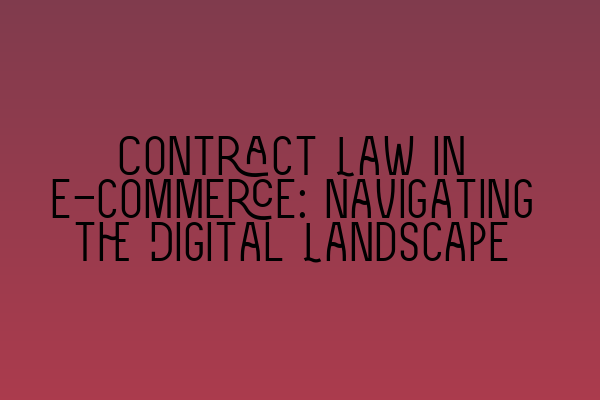Contract Law in E-commerce: Navigating the Digital Landscape
In today’s digital age, e-commerce has become a vital aspect of the global marketplace. From online shopping to digital services, businesses are increasingly relying on conducting transactions through digital platforms. However, with this shift towards the digital landscape, contract law plays a crucial role in ensuring the integrity of these transactions and protecting the rights and obligations of both parties involved.
At SQE Contract Law, we understand the complexities of contract law in the digital world. In this blog post, we will explore the various aspects of contract law in e-commerce, discussing key considerations, common challenges, and best practices to navigate the digital landscape effectively.
The Formation of e-Contracts
The formation of a contract in e-commerce follows the same fundamental principles as traditional contracts. However, certain considerations arise due to the unique nature of online transactions. One key element is the acceptance of an offer, which can be expressed through various means such as clicking an “I agree” button or making a purchase on a website. It is essential for businesses to have clear and easily accessible terms and conditions that users must agree to before entering into a contract. This helps to establish mutual understanding and mitigate potential disputes.
Furthermore, the issue of offer and acceptance becomes more complex when it comes to automated transactions, such as those implemented through algorithms or artificial intelligence. As these systems become more prevalent in e-commerce, it is crucial for businesses to ensure transparency and accountability in the formation of e-contracts.
Considerations for Online Consumer Contracts
When it comes to e-commerce, consumer protection is of utmost importance. Online consumer contracts need to comply with specific regulations to safeguard the rights of consumers. Businesses must provide clear and accessible information about the products or services being offered, including pricing, delivery terms, cancellation rights, and any additional charges. Failure to do so can result in legal consequences and damage to the reputation of a business.
One key aspect to consider in online consumer contracts is the inclusion of unfair contract terms. Unfair terms, such as terms that disproportionately favor the business or limit the consumer’s rights, are generally unenforceable. It is essential for businesses to review and revise their contracts regularly to ensure compliance with consumer protection laws.
International Considerations
E-commerce knows no boundaries, which means that businesses engaging in online transactions often operate on an international scale. This brings forth additional considerations in contract law. The laws and regulations governing contracts can vary from country to country, making it crucial for businesses to understand and comply with the legal requirements of the jurisdictions in which they operate.
International contracts require careful drafting, considering aspects such as choice of law, jurisdiction, and dispute resolution mechanisms. It is advisable for businesses to seek legal advice to ensure their contracts are valid and enforceable across borders.
Managing Disputes in E-commerce
Disputes are an inevitable part of any business, including e-commerce. However, resolving contractual disputes can be challenging in the digital landscape. In many cases, contract terms contain clauses regarding dispute resolution, such as arbitration or mediation. These alternative dispute resolution methods can provide a quicker and more cost-effective means of resolving disputes, especially in cross-border transactions.
It is crucial for businesses to carefully consider and include dispute resolution clauses in their contracts. Additionally, incorporating clear communication channels and complaint handling processes can help mitigate potential disputes and maintain positive customer relations.
Conclusion
Contract law forms the foundation of e-commerce, ensuring the legality and enforceability of transactions in the digital landscape. By understanding the unique considerations of contract law in e-commerce, businesses can navigate the digital world effectively, protect their interests, and provide a secure and transparent environment for their customers.
At SQE Contract Law, we specialize in contract law and offer comprehensive legal services to businesses operating in the digital marketplace. Whether you require assistance with contract drafting, dispute resolution, or compliance, our team of expert solicitors is here to help.
To learn more about SQE preparation courses or to stay updated on SRA SQE exam dates, check out our related articles:
